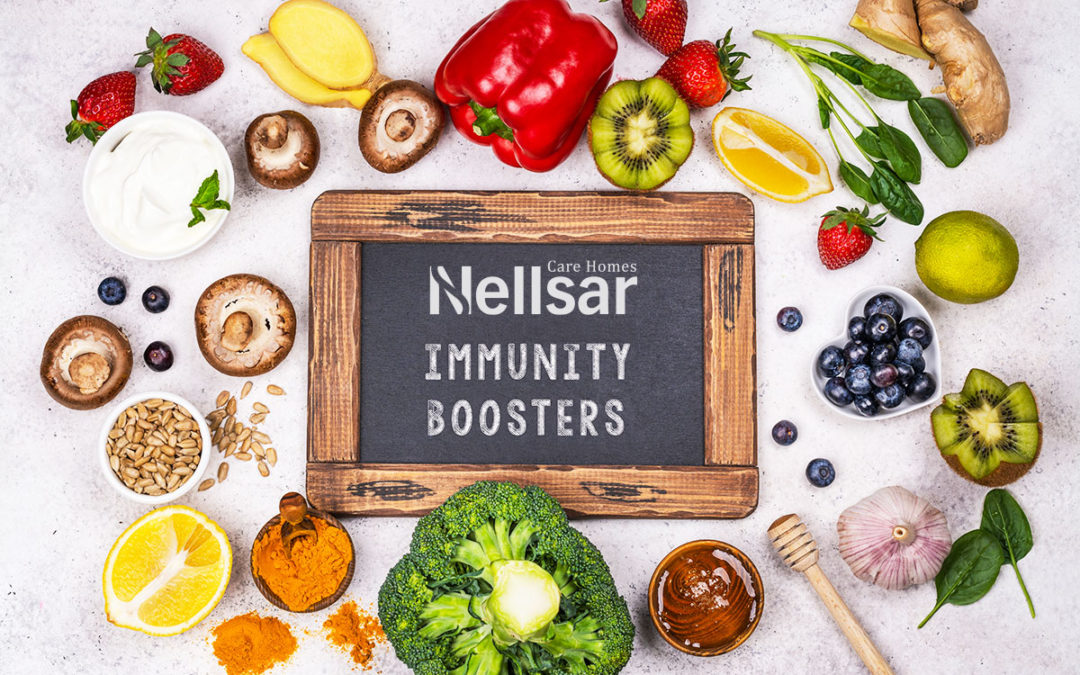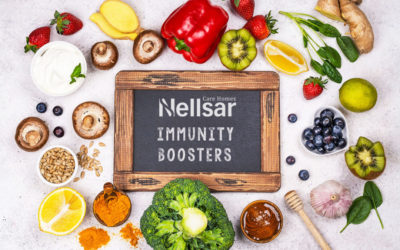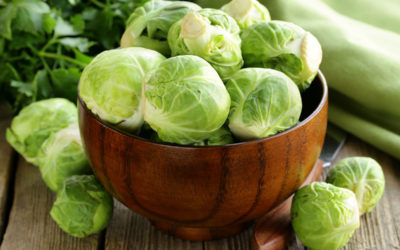As a leading UK care provider, Nellsar is responsible for the nutritional health and well-being of over 600 residents across our 13 Care Homes in Kent, Surrey and Essex. We were one of first care groups to employ a Nutritional Therapist to manage our nutrition and wellness provision.
A combination of nature and science, Nutritional Therapy acknowledges ‘the kitchen as the medicine cabinet’ and is extremely important to the elderly, particularly those in Residential Care with Dementia or specific health conditions or illnesses.
As Nellsar’s Nutrition and Wellness Manager, Leni Wood is a qualified Nutritional Therapist. Leni works with our Chefs and Head of Catering Services, Adrian Silaghi, to develop varied menus to nourish and entice our residents every day.
Never has it been more important to consider immune boosting ingredients in the foods we provide, to help defend our residents against viruses, including Coronavirus.
Read on for Leni’s latest blog.
Immunity
Your immune system is a collection of proteins, organs and parts of the body that work in unison to protect you from harm. This includes everything from the acid found in your stomach which prevents harmful bacteria invading your gut, to the thick protective layer of your skin that physically keeps harmful microbes out. Immunity also includes the complex network of specialised cells that work in coordinated sequences to maintain the harmony of your internal ecosystem. (1)
Our immune system is vast and covers many areas of our body in a complex and intricate way. It is impossible for any one food or supplement to boost the entire function of our immune system. When you think of how far it spreads from our skin, to our saliva, to our stomach acid. It stands to reason that there is no one fix wonder to ensure we are resilient.
The digestive system is considered to be ‘outside’ of the body because it is exposed to external entities such as food and microbes which can enter via food, drinks and from our hands etc.
When looking at the digestive system, which is a large piece of our immune network, the large intestine especially is full of a diverse forest floor of bacteria and microbes which help to keep our gut lining strong and healthy – which in turn helps us to stop unwanted, harmful microbes and debris from the outside world entering our internal body system.
Having a robust stomach lining and healthy microbiome will help us to be more resilient and bolster our ability to deal with infections, as well as help prevent pathogens from entering the blood stream.
How do we ensure a healthy gut?
Eating a rainbow diet of whole foods. Studies have shown that eating 30–40+ different plant-based foods (including spices and herbs) each week will improve the diversity of a healthy microbiome within the digestive system. In contrast, eating 10 or less can contribute to a poor microbiome and gut lining.
At Nellsar we make sure there are plenty of fruits and vegetables on offer for our residents each day. We have fibre-rich foods and add herbs and spices to many of our meals unless there is a specific request for more plain foods.
Vitamin D and Protective Immunity
Sufficient levels of vitamin D reduce your risk of infectious disease by strengthening your innate immune system. Vitamin D turns on key peptides in your immune system that trigger a strong anti-microbial response, allowing you to quickly and effectively fight off invaders before they can develop into a full-blown infection.
It is difficult to get enough vitamin D from food sources. The best place to get vitamin D from is sun exposure. In the autumn and winter months in the northern hemisphere, the sun is too low in the sky for us to obtain enough of the sunshine vitamin. We can however, supplement. By having vitamin D levels tested at your GP, or by asking a health professional to advise about buying a kit and testing at home, you can establish if you are deficient and how much you need to supplement.
Vitamin C
Vitamin C is known to help boost immunity. One study found that older adults who ate kiwi every day for a month had a significant decrease in the severity and duration of upper respiratory infection symptoms. “People often reach for orange juice to get vitamin C, but juice has a lot of sugar,” says Dr. Darling. “It’s better to get vitamin C from oranges, broccoli, kiwi or cantaloupe.” (3)
Sleep
A lack of sleep can affect the immune system. During sleep, your immune system releases proteins called cytokines, some of which help promote sleep. Certain cytokines need to increase when you have an infection or inflammation, or when you are under stress. Sleep deprivation may decrease production of these protective cytokines. (4)
Looking at sleep hygiene can help; for example no screen time an hour before bed, blackout curtains so no light can enter the room, or having a relaxing bath or reading before bed. Having a protein-rich snack before bed can sometimes help too, as going to bed on an empty stomach will make it more difficult for you to sleep through the night.
Exercise and fresh air
Stepping outside or exercising for 10–30 minutes per day, if you are able, can help you to feel better in yourself. “As people get older and their bodies decline in function, physical activity helps to slow that decline,” says Dr Nick Cavill, a Health-promotion Consultant.
I am a registered Nutritional Therapist on hand to help all Nellsar Homes to improve menus and speak to residents who might need some extra advice on any of the factors mentioned above. In these uncertain times our best defence is our own ability to protect ourselves and our residents with nourishing food and a nurturing environment.
Credits
1) ‘The Drs Kitchen Eat to beat illness’ Dr Rupy Aujla




